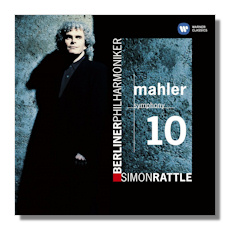
The Internet's Premier Classical Music Source
Related Links
- Mahler Reviews
- Latest Reviews
- More Reviews
-
By Composer
-
Collections
DVD & Blu-ray
Books
Concert Reviews
Articles/Interviews
Software
Audio
Search Amazon
Recommended Links
Site News
 CD Review
CD Review
Gustav Mahler's 10th Symphony is largely known through its Adagio, which is astoundingly beautiful on its own. Many great Mahler conductors choose to perform only this movement (as of November 2014, Classical Net has two such entries) but others have opted to present and conduct "completed" editions, especially the one from composer and scholar Deryck Cooke. Since Eugene Ormandy first recorded the Cooke for Columbia, many versions have followed. Simon Rattle is not always the most interesting conductor alive, but he does have a passion for Mahler's 10th, as this disc from 2000 is his second reading of the piece on disc.
His previous Bournemouth recording featured many good ideas, but also an orchestra audibly taxed by trying to execute them. I should mention this is not pure Cooke any more than it is pure Mahler; other arrangers had their hands in the cookie jar, so to speak. It may not matter to you; I confess it doesn't matter to me. In any event, the Berlin Philharmonic mostly sounds terrific. There are times where we (ironically, given the source) might wish for a richer string sound or a fuller brass tone. What I have no issue with is Simon Rattle, who uses quick tempos and some absolutely superlative balances to create an authentic Mahler sound with an orchestra that so rarely produces one.
Indeed, the brass have some shaky moments here and there, and by and large you can hear that this is not Karajan's band; there is little of the color or individuality that distinguished the great conductor's best Mahler performances. On the other hand, the sound is far more natural than anything that Karajan ever would have allowed, and the strings still have a reasonably glorious profile despite the aforementioned lack of weight. One critic I read called the orchestra something along the lines of an oversized chamber orchestra, and that's fairly accurate. For a Mahler recording to reveal so much inner detail is most welcome, but you also require a sonority that isn't always here. Still, this is a valuable document of a great orchestra playing Mahler, and one of Simon Rattle's more accomplished recordings.
Copyright © 2015, Brian Wigman





















